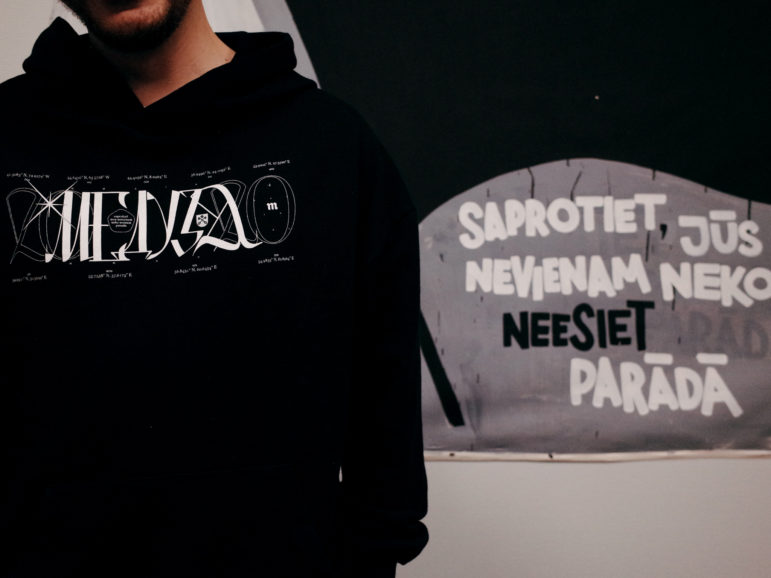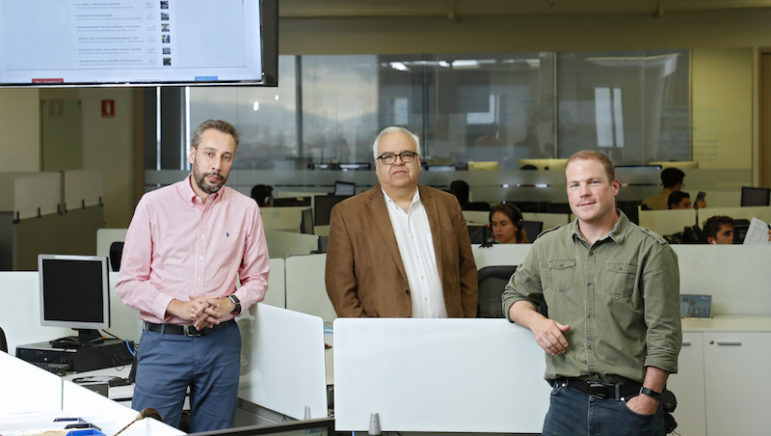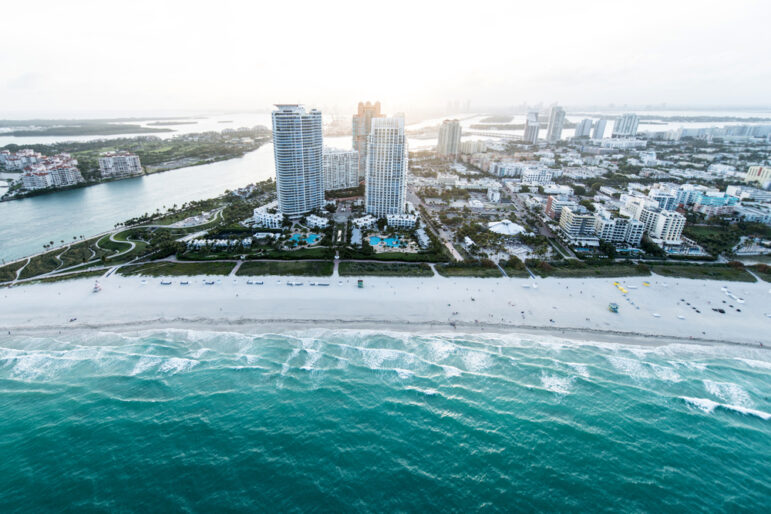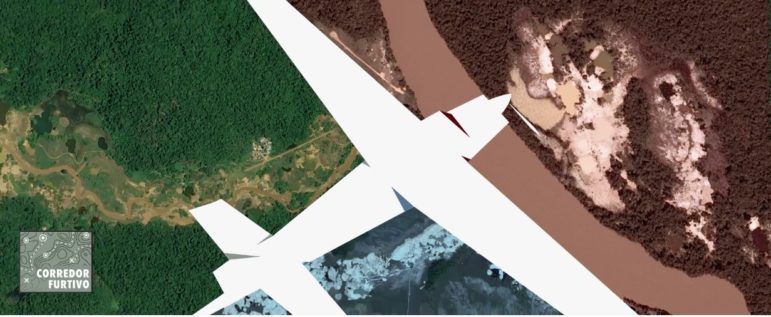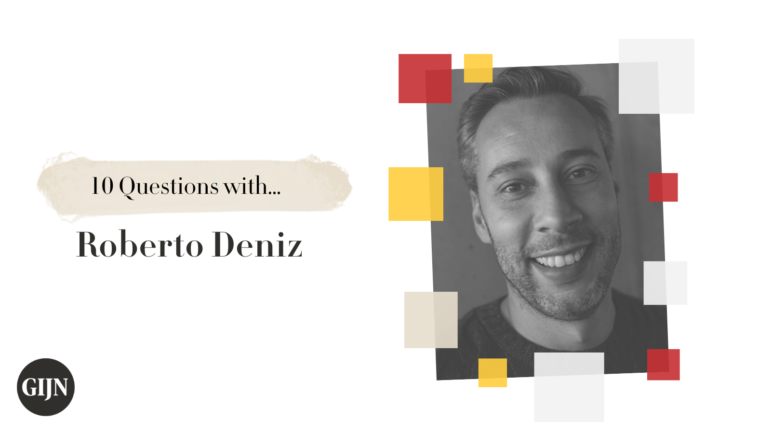

Forced into Exile After Investigating Corruption, Continuing to Report on Venezuela from Afar
Read this article in
As the political situation around him gradually worsened, Venezuelan investigative reporter Roberto Deniz knew that his work might, one day, bring him some trouble.
He had been labeled a traitor on state television, and there was also the problem of a social media campaign that labeled him a CIA agent, complete with an ugly, mocked-up photo of him behind bars. It was so untrue as to be laughable, he thought at first, but over time his situation became increasingly complicated.
When he was about to publish an in-depth report on corruption linked to a government food program that should have been providing healthy food parcels to the poor, he was advised it was best to leave the country. He thought he would have to lie low abroad for a few months — but several years later, he says it is still not safe for him to go back to Caracas.
Deniz works for the Venezuelan investigative outlet Armando.info, a GIJN member organization. Many members of the team — which won the Maria Moors Cabot Prize in 2019 — now have to report from exile. While that has brought challenges, Deniz acknowledges, there are many ways in which intrepid reporters can continue to investigate from overseas, though the personal costs are huge.
GIJN spoke to Deniz on the sidelines of Truth Tellers, the Harry Evans Investigative Journalism Summit in London, about an Emmy-nominated documentary film based on his investigation into a Colombian businessman and close confidant of Venezuelan President Nicolás Maduro. The responses have been edited for length and style.
GIJN: Of all the investigations you’ve worked on, which has been your favorite and why?
Roberto Deniz: If I had to choose one story, I would say one that we published at the beginning of 2018, La Mala Leche de los CLAP — the Bad Milk of the CLAP [the Venezuelan government’s Local Committees for Supply and Production]. Why that story? Because we revealed that the social program that Maduro created in 2016 to serve food to poor people in Venezuela was selling very bad-quality food.
We uncovered that the product, especially powdered milk, had very low levels of calcium and protein, but was very high in carbohydrates and sodium, which is terrible for kids. For me, that story was so powerful because, as an investigative journalist, it’s not easy to try to connect corruption with the lives of the people. In this story, of course, the reveal was terrible, because people were eating this food, but I think that it was a very good example of how corruption affects the daily life of the poorest people.
GIJN: What are the biggest challenges in terms of investigative reporting on your country?
RD: Investigative journalism in Venezuela has a lot of challenges, like other countries, but we have to consider some specific things. Of course, the autocratic context is one of them, because in Venezuela, not only the government, but all the institutions, the judicial system, all the institutions see journalists as an enemy. They all feel that journalists are working with the United States of America, and we are part of the CIA, and that is the reason we do our job. Venezuela is becoming more autocratic every day.
There are no public records in Venezuela. Other Latin American countries have the derecho de petition — FOIA. In Venezuela, that doesn’t exist, and not only does it not exist, the few things that were public are not public anymore, and it’s so difficult to get information in these conditions. And then when you get information, you need to be even more careful than in other moments — you need to verify with other sources, independent sources different from the sources that gave you the documents or the data.
Of course, it’s difficult for a source to feel free to talk with you, and there is another important issue, that [in exile] you need more time to talk with the source, to try to show trust that, yes, you are going to do the job, you’re going to try to protect all the sources.
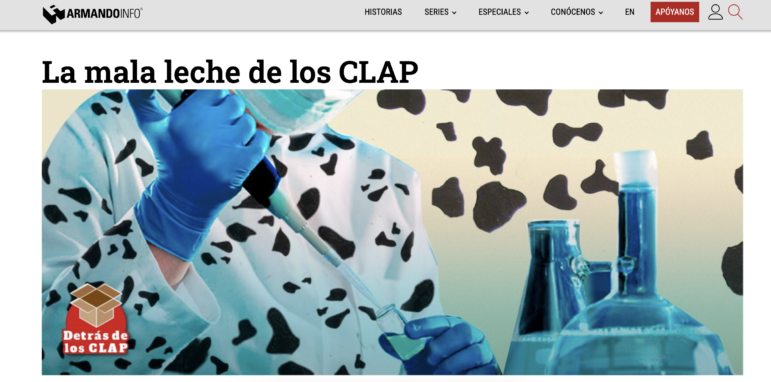
Roberto Deniz’s 2018 Armando.info investigation, La Mala Leche de los CLAP, revealed that food served to the poor under a special social program contained harmful amounts of carbohydrates and sodium. Image: Screenshot, Armando.info
GIJN: What’s been the greatest challenge that you’ve faced personally in your time as an investigative journalist?
RD: It was the moment when I had to decide whether to stay in Venezuela or get out and try to be safe and continue with my work. Definitely, that was the most difficult moment, not only for the moment when you face that decision, but I think that the most difficult part is related to your family. It’s not easy to accept that you are not sharing time with your family. You are living abroad. You cannot go back. And, you know, my parents, for example, they are still alive, but they are getting older, and I would like to be with them, and I can’t.
But I had no choice, because if I stayed in Venezuela, I definitely couldn’t have continued working as an investigative journalist. It was a key moment in my life. I didn’t have a lot of time to make the decision, but I think that I did the correct thing.
GIJN: What is your best tip for interviewing?
RD: I would say that the best tip for interviewing is to trust your sources, and you have to be fully transparent from the beginning. When you start to talk with a source for an interview you need to clear what it is you can do, and your objective to talk with that source. I would say that that is the most important thing because you create this trust, but it is also important that your sources know who you are, know how you work, and why you are doing what you are doing.
Of course, many sources want to talk with you because they have some interest, or they want to talk bad about a political rival, or, they want to talk about an entrepreneur that is fighting for the same business with the Venezuelan government. And as journalists we have to put it clearly: “Well, this is a story I am interested in because this is important for this reason, and that is my only interest in this thing. If you have another interest that is your business, not my business.”
GIJN: What is a favorite reporting tool, database, or app that you use in your investigations?
RD: I think that I am an old-school journalist. I would say that my favorite tool is my notebook.
But nowadays, for example, there are a lot of tools that are very useful, because one of the most boring things in journalism is transcribing all the conversations. There is another type of tool that is very useful because I like to create timelines, the timelines of the investigation, when the thing happened, and what was happening in the country at that moment of this investigation. It’s like all of the things that you have in your mind, of the story, and you can watch it on three levels.
GIJN: What’s the best advice you’ve gotten in your career and what words of advice would you give an aspiring investigative journalist?
RD: I don’t know if it counts as advice, but something that we repeat often in the small newsroom of Armando.info is to always keep in mind why you are doing your job and remember that what you are doing is very important for society. Even in countries like Venezuela, autocratic countries, with censorship, with persecution and differences, it’s important. And the important thing is not [just] the impact, but the meaning of that story in the life of the people.
GIJN: Who is a journalist you admire, and why?
RD: There are many Latin American journalists that I really admire — Gustavo Gorriti, an important journalist in Peru, Ricardo Calderón, a Colombian investigative journalist, and I really admire Leila Guerriero, an Argentinian journalist, who has written a lot of books, chronicles about different things in Argentina. But of course, first I have to talk about Venezuelan journalists, who right now are suffering a lot. Many journalists had to flee the country after the presidential election last July. But in general terms, I would say that some important Venezuelan journalists have shown the capacity to continue doing the job even outside of Venezuela.
In our newsroom, I think that the role of Ewald Scharfenberg, the founder and editor, is very, very important, because he is a journalist with more experience than most of the journalists working at Armando.info. And he always has this capacity to watch, from outside, what we are doing and he works with a very strategic sense of our job.
GIJN: What is the greatest mistake you’ve made and what lessons did you learn?
RD: I can remember a mistake when I was starting to work as a journalist in a Venezuelan newspaper called El Universal. I remember I wrote an article about a legal protest that was happening in a factory in Venezuela. When it was published, I received a call from somebody who asked: “Did you call the other party?” And I said, “Well, I tried to contact them, but I didn’t talk with anybody.”
And this person told me, “Well, I am X, and I am the legal representative of the company.’” This guy told me: “I don’t want to attack you. I don’t want to fight, I just want to say that it’s important to you as a journalist, but also to the readers of your newspaper, that they know our position. All the details that you miss in the story.”
When you are working in a newsroom, in a newspaper, you are in a hurry every day, and [sometimes] you miss something. That was a very good lesson for me. And the most important thing is that it happened when I was starting out as a journalist.
GIJN: How do you avoid burnout in your line of work?
RD: I always say, like a joke, “Are there any psychologists in the room?” if I am talking about this at a conference or something. But I always say that there was a moment when I cut the emotions, and I put them aside. Roberto the journalist is the one who continues working, but the emotions are totally aside. I don’t know if that is good for our mental health.
But I would say that the first thing, and it’s so difficult, but I think that we have to be careful and we have to keep in mind always that this is not personal. You are not doing this because you want to fight with this politician, because you want to fight with this businessman.
The other thing is always try to trust as much as you can in your editor. That is very important, even when you feel that you are, you know, done, or you can’t continue with the story. You have to trust in your editor, in your team, and talk with them.
And then, I try to do exercise, especially to run. When I run, I try to forget everything, and it’s good not only for my physical but mostly for my mental health. And then to try to read other things not related with your job, books, novels. I really like Latin American literature, and I try to maybe watch TV shows, movies, comedy or something.
But there are moments where I feel really burned out. For me, for example, it was in 2021, the day when the police went to my parents’ house in Caracas. I suppose that they were looking to see if I was there. And for me, those days were terrible, because I really felt, this is happening because of my job, and dealing with that emotion and that feeling is not easy to deal with.
In the end, it’s something that we have to be very conscious about, burnout, we have to do more for our mental health, and yes, if you feel that you are burnt out, you have to stop, you have to recover. You have to be safe and be okay to continue with your job.
GIJN: What about investigative journalism do you find frustrating, or do you hope will change in the future?
RD: I feel this applies to countries like Venezuela and even countries like Colombia: that there are moments where people don’t react to corruption. That people don’t understand how corruption affects their life. For me, as a journalist but also as a citizen it is difficult to understand. Of course it is a challenge for me as a journalist — to try and tell a story to catch their attention, to connect with the real situation of people.
When you see the Venezuela crisis that we have lived through these years, it’s incredible because there’s no civil war in Venezuela, there’s no natural catastrophe in Venezuela, but the numbers of the crisis are the same as in civil wars or natural disasters. It’s incredible. And one of the main things to explain it — is corruption.
I think we are living in a period when it’s difficult to be a journalist, but having said that, I also think it’s a period when it’s very important to be a journalist. My hope as a Venezuelan journalist is that things can change in my country, not for me, but for people, that the country can recover, not only in an eco-social way, but also in a democratic way. That’s going to be good not for my generation, but the next generation of journalists.
 Laura Dixon is a senior editor at GIJN, based in the UK. She has reported from Colombia, the US, and Mexico, and her work has been published by The Times, The Washington Post, and The Atlantic, among others. She is a former staff reporter of The Times in London, and has received grants and fellowships from the IWMF, the Pulitzer Center, and Journalists for Transparency.
Laura Dixon is a senior editor at GIJN, based in the UK. She has reported from Colombia, the US, and Mexico, and her work has been published by The Times, The Washington Post, and The Atlantic, among others. She is a former staff reporter of The Times in London, and has received grants and fellowships from the IWMF, the Pulitzer Center, and Journalists for Transparency.




